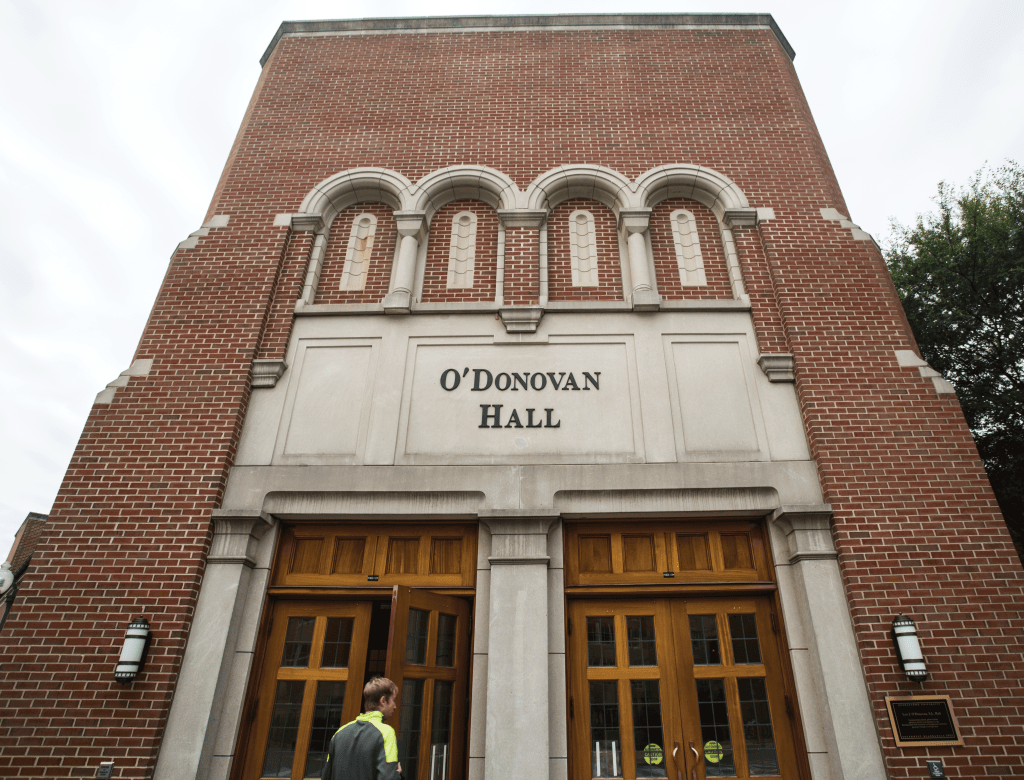Because of high levels of contamination, student volunteers have begun monitoring a composting pilot program in O’Donovan Hall.
Beginning this past fall, post-consumer composting, an initiative led by the Office of Sustainability, seeks to reduce landfill waste by collecting organic materials to be turned into soil by the decomposition process.
Though the bins have been closed most of this semester because of high levels of contamination, when open, Hoya Hospitality and the Office of Sustainability has used students volunteers during peak meal times to help students separate their waste.

This voluntary monitoring system has reduced the amount of non-compostable material found in the bins, according to Samantha Panchèvre (SFS ’19), Georgetown University Student Association sustainability chair.
“Based on what I’ve heard from the Office of Sustainability, this program has been successful at both mitigating compost contamination—which is hugely important otherwise it would compromise the entire stream and risk getting our contract cut—and educating students about how to properly compost,” Panchèvre wrote in an email to The Hoya.
The voluntary monitoring role should be made into a paid student position, especially during the beginning of each semester when new students are still unaware of environmental initiatives, according to Panchèvre.
The composting vendor used by the office for the program would not accept contaminated compost, leading to the initial decision to close the bins, according to Office of Sustainability intern Chelsea Hafer (COL ’22). (Full disclosure: Hafer is a staff writer for the news section of The Hoya).
Hoya Hospitality partners with the Office of Sustainability to pursue opportunities for waste-related initiatives, collect statistics and data on waste and organize pick-ups around recycling and composting, according to their website.
The organization claims 90 percent of all waste from Leo’s is composted.
The pilot composting program includes audits on the amount of non-compostable material found in the Leo’s composting bins. Interns at the Office of Sustainability manually sort through the compost to get statistics on how much and what kind of contamination is present, according to Hafer.
Volunteers include Noelle Gignoux (SFS ’22) and Hannah Funk (SFS ’20), co-chairs of composting for the student-run environmental organization Georgetown Renewable Energy and Environmental Network.
GREEN is in the pilot composting program to educate students on the importance of composting and instill it as a norm on campus, Gignoux said.
GREEN is also working to eventually facilitate composting in residence halls and at the Georgetown Farmers’ Market, according to Funk.
“Our main initiatives this semester are that we applied to a Laudato Si’ Grant to promote residential compost and we’re currently partnering with Hilltop Compost at the Farmer’s Market,” Funk said. “We’ve also done some volunteering at the Leo’s compost initiative to try to educate students about what is and what is not compostable.”
The Farmer’s Market is set to return to campus for the rest of the semester Wednesday.
To improve the current system at the dining hall, the Office of Sustainability is working on more signage and educational programs to teach students how to compost.
The monitoring of the compost bins will continue until students know how to properly sort their waste, according to Hafer.
“We are hoping to get the compost program up and running before the next academic year,” Hafer wrote. “The main problem is that students don’t know how to compost, and if they do, they don’t do it correctly. We need students to know that without them, we can’t have a functioning compost program. It is so important for students to compost correctly.”




















